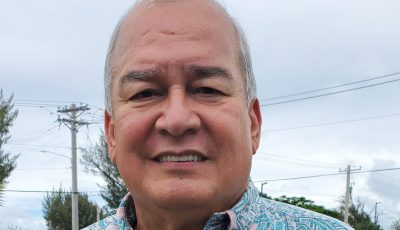Kilili upbeat over chances of NMI immigration bills
Delegate Gregorio Kilili C. Sablan (Ind-MP) is hoping to weave the same magic that he did in the 115th U.S. Congress, where he managed to help pass two legislation about labor and immigration in the CNMI in a Republican-controlled House of Representatives.
H.R. 339 is now Public Law 115-53; H.R. 5956 became P.L. 115-218.
“I can say that, despite the difficulty, I was able to get two immigration bills passed under the administration of President Donald Trump. So, there’s a possibility [of bills passing]. We just need to have a lot of work and cooperation,” Sablan told Saipan Tribune.
P.L. 115-53 or the Northern Mariana Islands Economic Expansion Act revised the CNMI-Only transitional worker visa numerical cap by adding 2,002 while also increasing the vocational educational fees—which is paid by a local employer for every transitional worker it hires—from $150 to $200 and barring construction occupation permits from the CW-1 program.
P.L. 115-218 or the Northern Mariana Islands U.S. Workforce Act of 2018 extended the CW-1 program up to 2029 and set a numerical cap of 13,000 for fiscal year 2019. The cap would be slashed by 500 in fiscal year 2020, which begins on Oct. 1, and three more times up to fiscal year 2023. Fiscal years 2024 to 2029 will have a reduction of 1,000 each and by 2030 the numerical cap is 1,000.
This time, Sablan introduced H.R. 559 or the NMI Long-Term Legal Residents Relief Act that would grant seven groups of foreign nationals under the parole program CNMI-only status, while H.R. 560 or the NMI Residents Relief Act would give long-term guest workers improved status.
Sablan, as vice chairman of Insular Affairs under the House Natural Resources Committee, left Saipan last week to prepare for a scheduled committee hearing on Feb. 27.
Gov. Ralph DLG Torres, Guam Gov. Lou Leon Guerrero, as well as representatives of federal agencies connected with labor and immigration have been invited to testify at the committee hearing.
Sablan said the U.S. Department of Homeland Security and the Department of Labor have declined to attend the hearing.
The U.S. Government Accountability Office—which is the auditing, evaluation, and investigative services arm of the U.S. Congress—was also invited to testify.
“There might be somebody from DHS, DoL, and USCIS in the room and would observe. Or they would watch it on [cable channel] C-SPAN. I’m not sure if GAO accepted the invitation but they asked for copies of the bill [H.R. 559],” said Sablan.
The hearing is in connection with the legislative fix that USCIS has suggested that must be done after director L. Francis Cissna terminated the CNMI parole program in December. USCIS gave a 180-day window, which ends on June 29, in order for a legislative fix for the affected individuals.
Sablan said H.R. 559—if it becomes law—would help solve the problem of spouses and immediate relatives of citizens of Freely Associated States and spouses or IRs of U.S. citizens; parents of U.S. citizen children who are under and over 21 years old; CNMI permanent residents, stateless individuals, and E-2C CNMI-only investors.
“[President] Trump issued a directive last year. DHS reviewed the categorical parole for the CNMI and decided that it falls within the directive of the president, that’s why they discontinued the program that I was able to get under the administration of [former] President [Barack] Obama,” Sablan said.
“They [individuals under the parole program] can’t stay here no later than June 30. So, there’s some sense of urgency to this. They are not a big group, but it is more focused that includes the E2C investors.”
He added that USCIS offered assistance to draft the legislation. “It would give us ideas [drafting assistance] on what’s in their [USCIS] minds. Their drafting assistance only covers five groups and does not include CW workers.”
“The bill that USCIS drafted did not include CW workers since their reasoning is there’s still time to do legislation for CW workers. While I don’t disagree with that, without the political support of a bill [H.R. 560] such as this from DHS, chances of it becoming a law is very little,” said Sablan.
Sablan said the hearing is also in connection with the H-2B visa problem that the CNMI and Guam is currently experiencing. DHS removed last month the Philippines, Dominican Republic, and Ethiopia from the list of eligible countries whose workers are eligible to be petitioned to the U.S. via the H-2B visa program.
“I want to give governor Torres and governor Leon Guerrero the chance and hear what they think. Governor Torres has already sent me a letter and I met with him here [last] Monday (Feb. 18). It is important in this hearing that we need to look at the different options that we have. We just came from a historic 35-day shutdown over an immigration issue; it is easier to reopen the government than to agree on immigration bills.”
“[USCIS] offered its drafting assistance. My question is, do I have the political support of DHS? And I have not been able to get that yet. We’re having a hearing anyway. …Included in the hearing is the review of H2-B workers and the bar on Philippine citizens. That is another complicated issue that includes Guam, with Gov. Leon Guerrero also testifying.”



























